Sustainable Development: Smart Water Management in Urban Cities Report 2022
VerifiedAdded on 2022/08/29
|14
|3537
|13
AI Summary
Contribute Materials
Your contribution can guide someone’s learning journey. Share your
documents today.
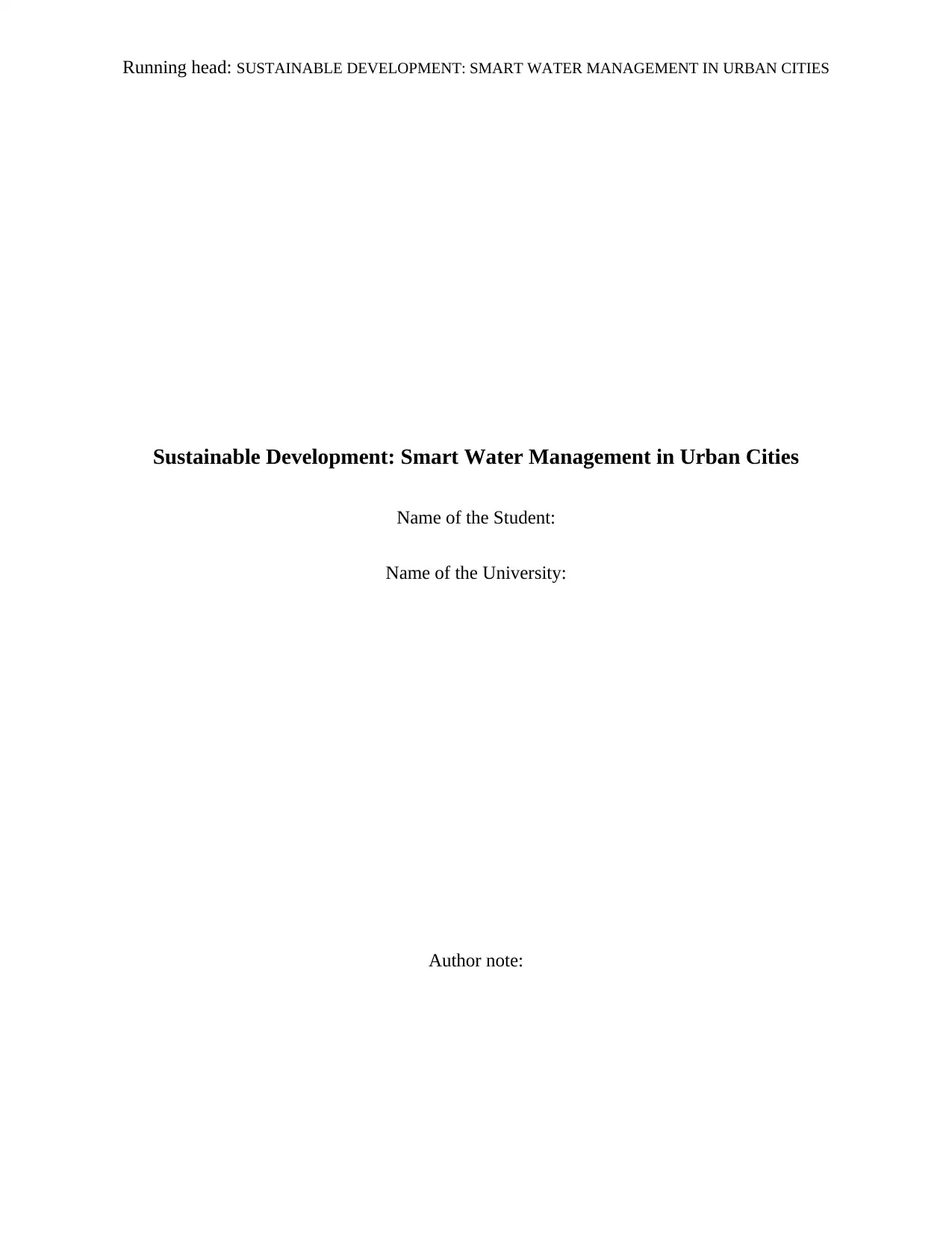
Running head: SUSTAINABLE DEVELOPMENT: SMART WATER MANAGEMENT IN URBAN CITIES
Sustainable Development: Smart Water Management in Urban Cities
Name of the Student:
Name of the University:
Author note:
Sustainable Development: Smart Water Management in Urban Cities
Name of the Student:
Name of the University:
Author note:
Secure Best Marks with AI Grader
Need help grading? Try our AI Grader for instant feedback on your assignments.
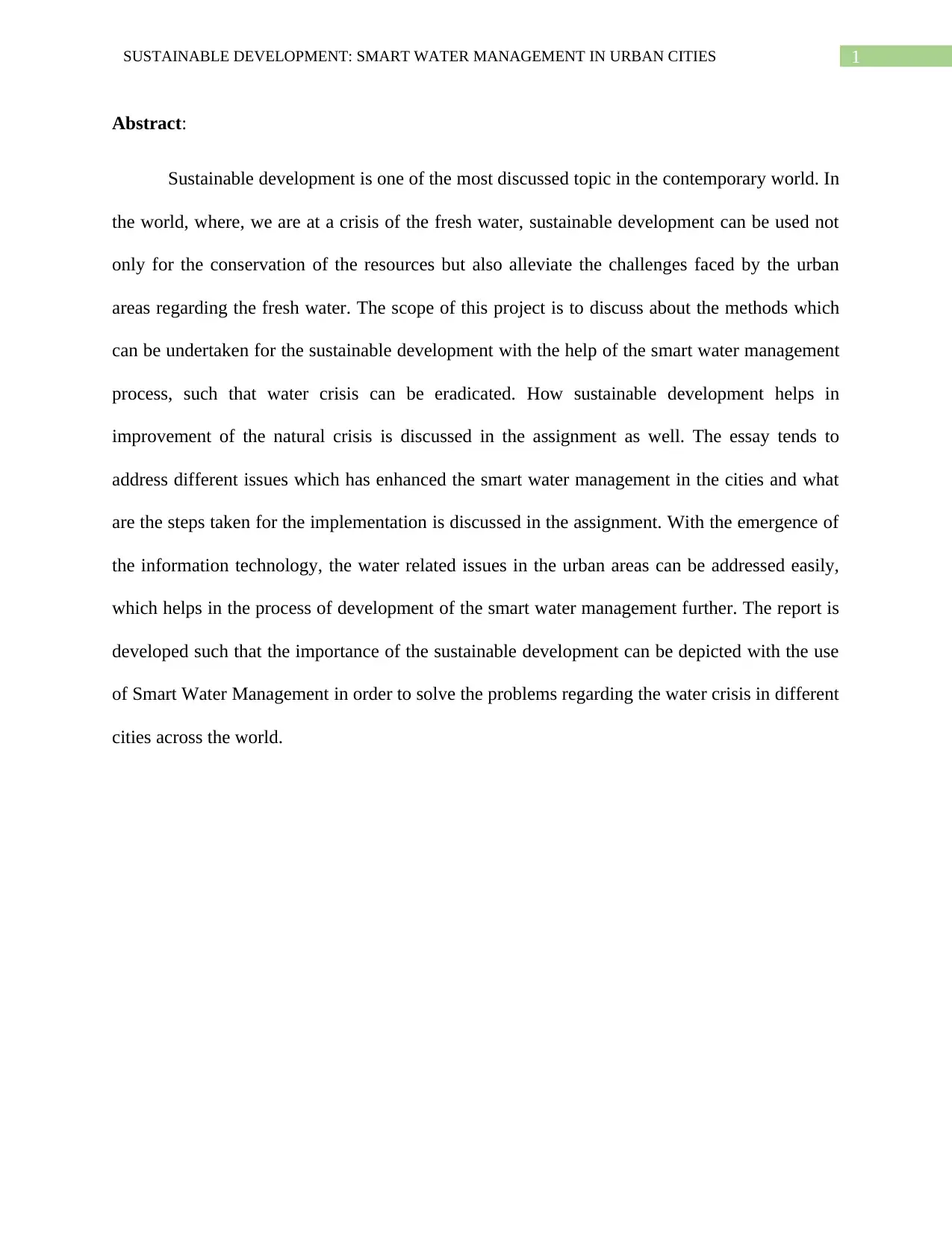
1SUSTAINABLE DEVELOPMENT: SMART WATER MANAGEMENT IN URBAN CITIES
Abstract:
Sustainable development is one of the most discussed topic in the contemporary world. In
the world, where, we are at a crisis of the fresh water, sustainable development can be used not
only for the conservation of the resources but also alleviate the challenges faced by the urban
areas regarding the fresh water. The scope of this project is to discuss about the methods which
can be undertaken for the sustainable development with the help of the smart water management
process, such that water crisis can be eradicated. How sustainable development helps in
improvement of the natural crisis is discussed in the assignment as well. The essay tends to
address different issues which has enhanced the smart water management in the cities and what
are the steps taken for the implementation is discussed in the assignment. With the emergence of
the information technology, the water related issues in the urban areas can be addressed easily,
which helps in the process of development of the smart water management further. The report is
developed such that the importance of the sustainable development can be depicted with the use
of Smart Water Management in order to solve the problems regarding the water crisis in different
cities across the world.
Abstract:
Sustainable development is one of the most discussed topic in the contemporary world. In
the world, where, we are at a crisis of the fresh water, sustainable development can be used not
only for the conservation of the resources but also alleviate the challenges faced by the urban
areas regarding the fresh water. The scope of this project is to discuss about the methods which
can be undertaken for the sustainable development with the help of the smart water management
process, such that water crisis can be eradicated. How sustainable development helps in
improvement of the natural crisis is discussed in the assignment as well. The essay tends to
address different issues which has enhanced the smart water management in the cities and what
are the steps taken for the implementation is discussed in the assignment. With the emergence of
the information technology, the water related issues in the urban areas can be addressed easily,
which helps in the process of development of the smart water management further. The report is
developed such that the importance of the sustainable development can be depicted with the use
of Smart Water Management in order to solve the problems regarding the water crisis in different
cities across the world.
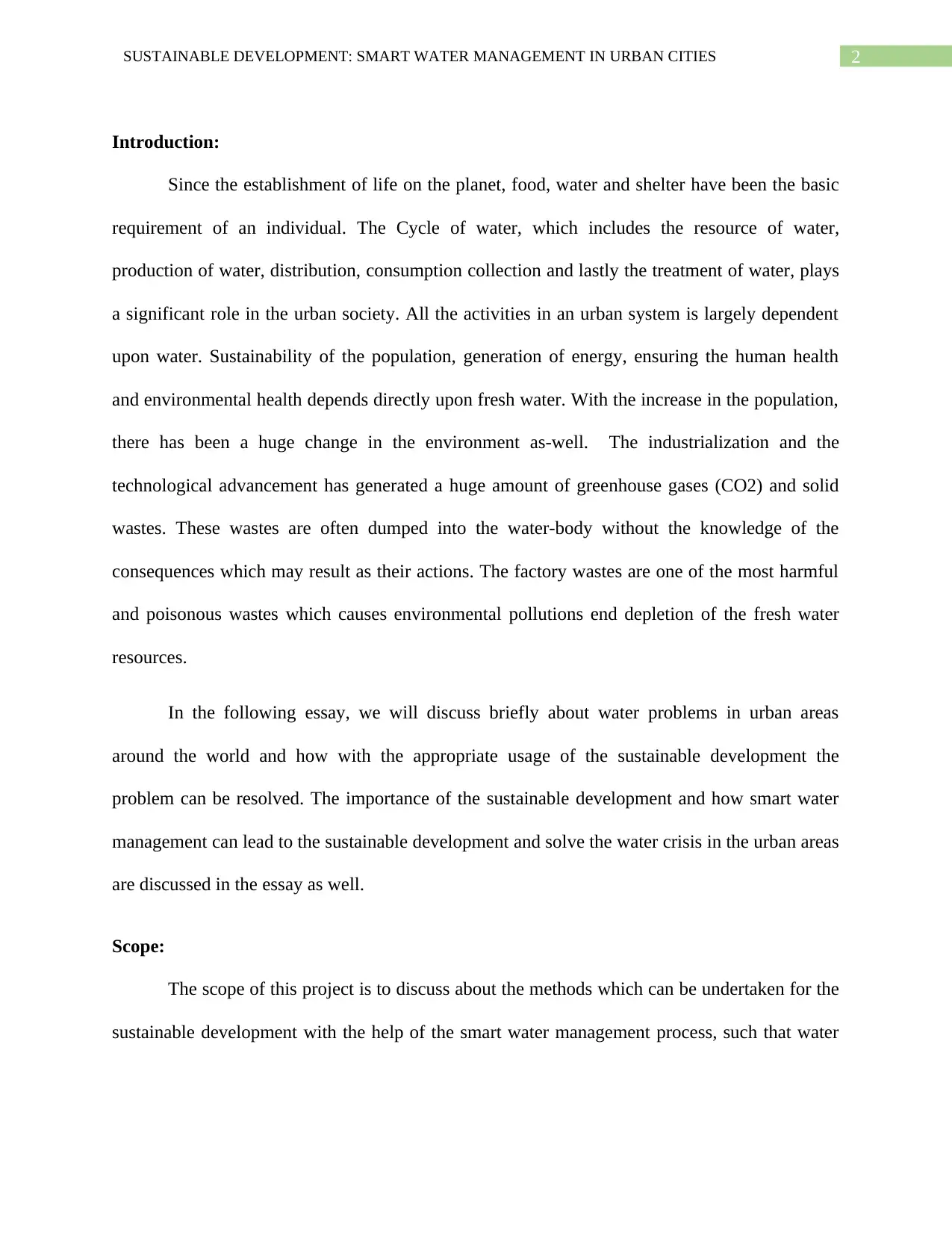
2SUSTAINABLE DEVELOPMENT: SMART WATER MANAGEMENT IN URBAN CITIES
Introduction:
Since the establishment of life on the planet, food, water and shelter have been the basic
requirement of an individual. The Cycle of water, which includes the resource of water,
production of water, distribution, consumption collection and lastly the treatment of water, plays
a significant role in the urban society. All the activities in an urban system is largely dependent
upon water. Sustainability of the population, generation of energy, ensuring the human health
and environmental health depends directly upon fresh water. With the increase in the population,
there has been a huge change in the environment as-well. The industrialization and the
technological advancement has generated a huge amount of greenhouse gases (CO2) and solid
wastes. These wastes are often dumped into the water-body without the knowledge of the
consequences which may result as their actions. The factory wastes are one of the most harmful
and poisonous wastes which causes environmental pollutions end depletion of the fresh water
resources.
In the following essay, we will discuss briefly about water problems in urban areas
around the world and how with the appropriate usage of the sustainable development the
problem can be resolved. The importance of the sustainable development and how smart water
management can lead to the sustainable development and solve the water crisis in the urban areas
are discussed in the essay as well.
Scope:
The scope of this project is to discuss about the methods which can be undertaken for the
sustainable development with the help of the smart water management process, such that water
Introduction:
Since the establishment of life on the planet, food, water and shelter have been the basic
requirement of an individual. The Cycle of water, which includes the resource of water,
production of water, distribution, consumption collection and lastly the treatment of water, plays
a significant role in the urban society. All the activities in an urban system is largely dependent
upon water. Sustainability of the population, generation of energy, ensuring the human health
and environmental health depends directly upon fresh water. With the increase in the population,
there has been a huge change in the environment as-well. The industrialization and the
technological advancement has generated a huge amount of greenhouse gases (CO2) and solid
wastes. These wastes are often dumped into the water-body without the knowledge of the
consequences which may result as their actions. The factory wastes are one of the most harmful
and poisonous wastes which causes environmental pollutions end depletion of the fresh water
resources.
In the following essay, we will discuss briefly about water problems in urban areas
around the world and how with the appropriate usage of the sustainable development the
problem can be resolved. The importance of the sustainable development and how smart water
management can lead to the sustainable development and solve the water crisis in the urban areas
are discussed in the essay as well.
Scope:
The scope of this project is to discuss about the methods which can be undertaken for the
sustainable development with the help of the smart water management process, such that water
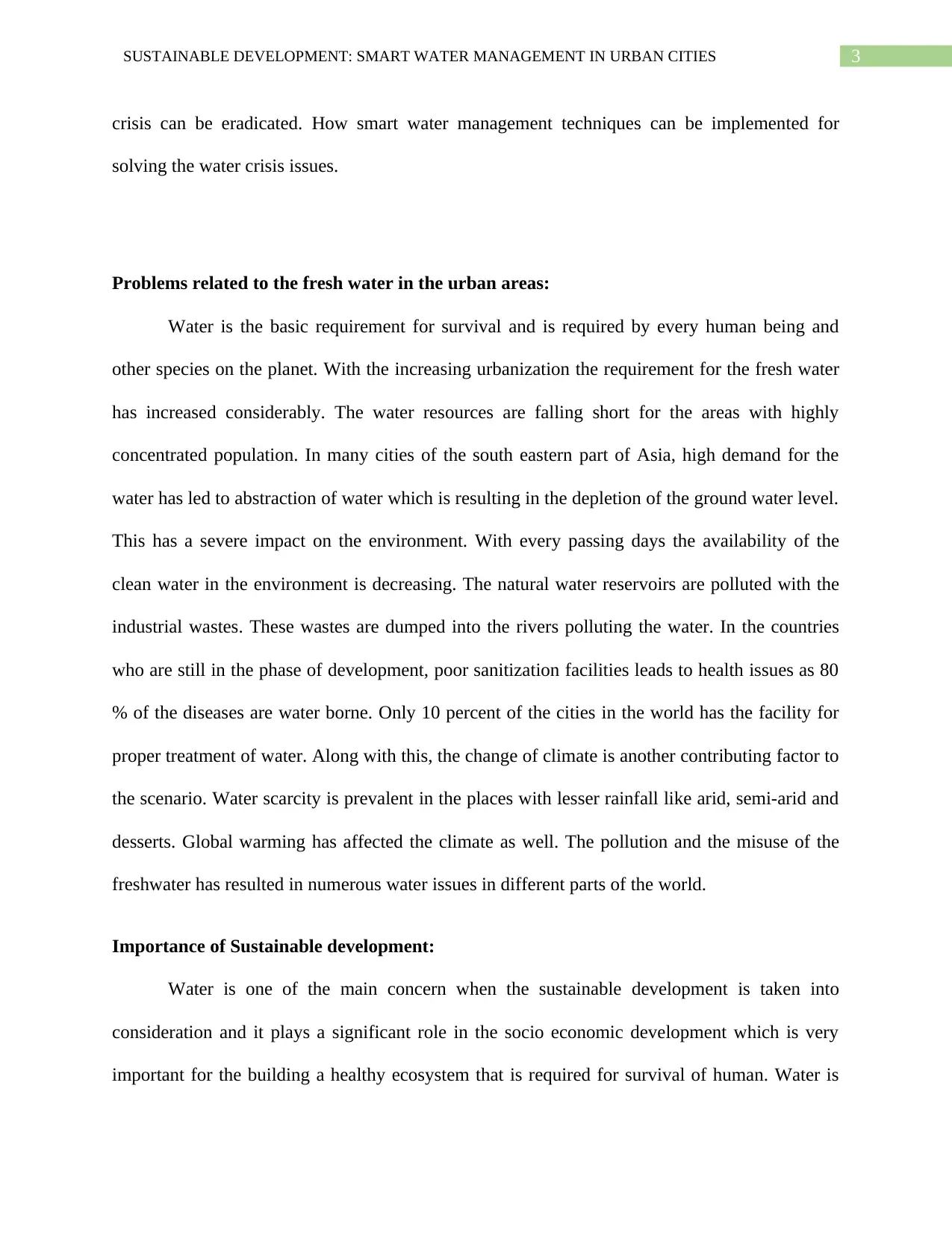
3SUSTAINABLE DEVELOPMENT: SMART WATER MANAGEMENT IN URBAN CITIES
crisis can be eradicated. How smart water management techniques can be implemented for
solving the water crisis issues.
Problems related to the fresh water in the urban areas:
Water is the basic requirement for survival and is required by every human being and
other species on the planet. With the increasing urbanization the requirement for the fresh water
has increased considerably. The water resources are falling short for the areas with highly
concentrated population. In many cities of the south eastern part of Asia, high demand for the
water has led to abstraction of water which is resulting in the depletion of the ground water level.
This has a severe impact on the environment. With every passing days the availability of the
clean water in the environment is decreasing. The natural water reservoirs are polluted with the
industrial wastes. These wastes are dumped into the rivers polluting the water. In the countries
who are still in the phase of development, poor sanitization facilities leads to health issues as 80
% of the diseases are water borne. Only 10 percent of the cities in the world has the facility for
proper treatment of water. Along with this, the change of climate is another contributing factor to
the scenario. Water scarcity is prevalent in the places with lesser rainfall like arid, semi-arid and
desserts. Global warming has affected the climate as well. The pollution and the misuse of the
freshwater has resulted in numerous water issues in different parts of the world.
Importance of Sustainable development:
Water is one of the main concern when the sustainable development is taken into
consideration and it plays a significant role in the socio economic development which is very
important for the building a healthy ecosystem that is required for survival of human. Water is
crisis can be eradicated. How smart water management techniques can be implemented for
solving the water crisis issues.
Problems related to the fresh water in the urban areas:
Water is the basic requirement for survival and is required by every human being and
other species on the planet. With the increasing urbanization the requirement for the fresh water
has increased considerably. The water resources are falling short for the areas with highly
concentrated population. In many cities of the south eastern part of Asia, high demand for the
water has led to abstraction of water which is resulting in the depletion of the ground water level.
This has a severe impact on the environment. With every passing days the availability of the
clean water in the environment is decreasing. The natural water reservoirs are polluted with the
industrial wastes. These wastes are dumped into the rivers polluting the water. In the countries
who are still in the phase of development, poor sanitization facilities leads to health issues as 80
% of the diseases are water borne. Only 10 percent of the cities in the world has the facility for
proper treatment of water. Along with this, the change of climate is another contributing factor to
the scenario. Water scarcity is prevalent in the places with lesser rainfall like arid, semi-arid and
desserts. Global warming has affected the climate as well. The pollution and the misuse of the
freshwater has resulted in numerous water issues in different parts of the world.
Importance of Sustainable development:
Water is one of the main concern when the sustainable development is taken into
consideration and it plays a significant role in the socio economic development which is very
important for the building a healthy ecosystem that is required for survival of human. Water is
Secure Best Marks with AI Grader
Need help grading? Try our AI Grader for instant feedback on your assignments.
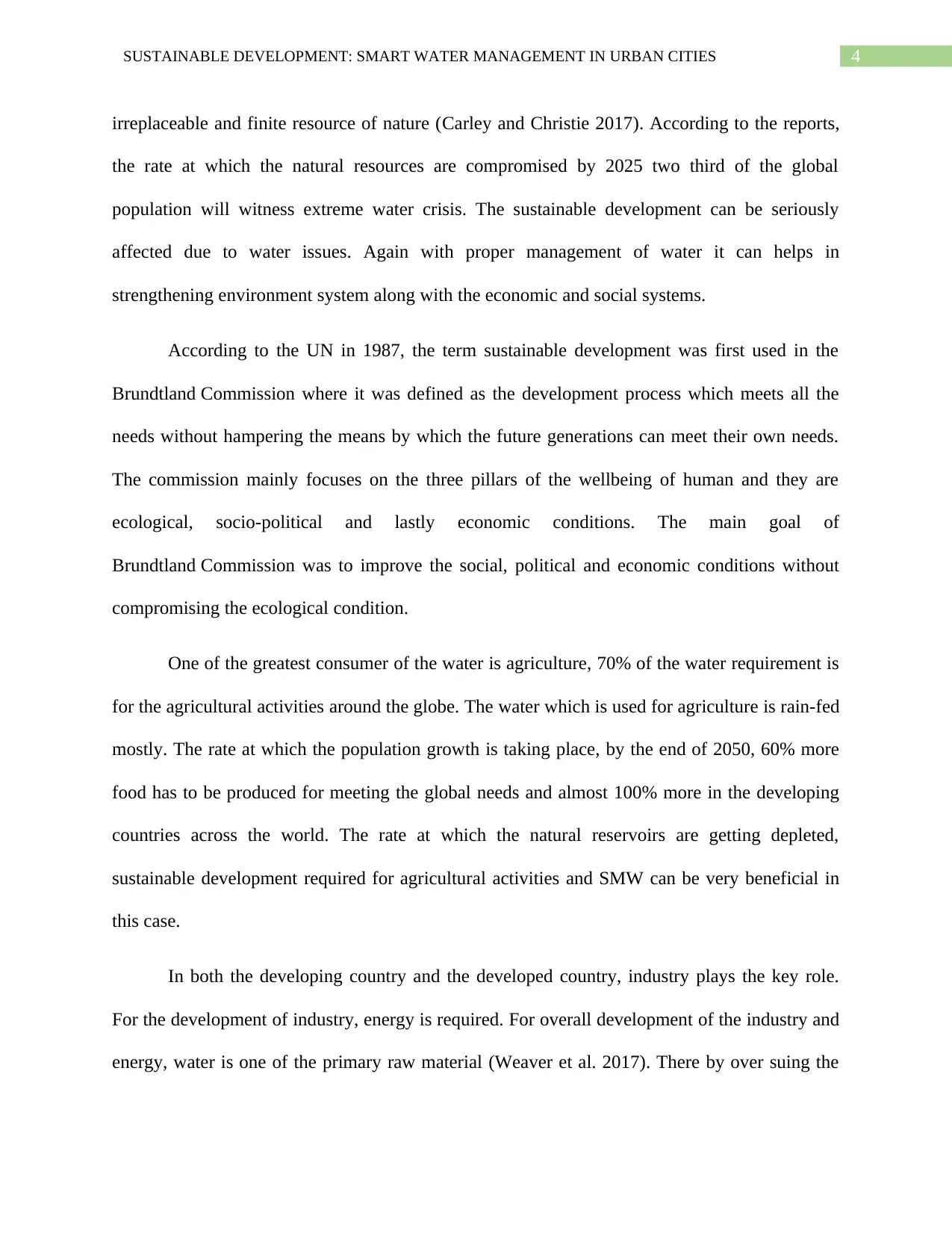
4SUSTAINABLE DEVELOPMENT: SMART WATER MANAGEMENT IN URBAN CITIES
irreplaceable and finite resource of nature (Carley and Christie 2017). According to the reports,
the rate at which the natural resources are compromised by 2025 two third of the global
population will witness extreme water crisis. The sustainable development can be seriously
affected due to water issues. Again with proper management of water it can helps in
strengthening environment system along with the economic and social systems.
According to the UN in 1987, the term sustainable development was first used in the
Brundtland Commission where it was defined as the development process which meets all the
needs without hampering the means by which the future generations can meet their own needs.
The commission mainly focuses on the three pillars of the wellbeing of human and they are
ecological, socio-political and lastly economic conditions. The main goal of
Brundtland Commission was to improve the social, political and economic conditions without
compromising the ecological condition.
One of the greatest consumer of the water is agriculture, 70% of the water requirement is
for the agricultural activities around the globe. The water which is used for agriculture is rain-fed
mostly. The rate at which the population growth is taking place, by the end of 2050, 60% more
food has to be produced for meeting the global needs and almost 100% more in the developing
countries across the world. The rate at which the natural reservoirs are getting depleted,
sustainable development required for agricultural activities and SMW can be very beneficial in
this case.
In both the developing country and the developed country, industry plays the key role.
For the development of industry, energy is required. For overall development of the industry and
energy, water is one of the primary raw material (Weaver et al. 2017). There by over suing the
irreplaceable and finite resource of nature (Carley and Christie 2017). According to the reports,
the rate at which the natural resources are compromised by 2025 two third of the global
population will witness extreme water crisis. The sustainable development can be seriously
affected due to water issues. Again with proper management of water it can helps in
strengthening environment system along with the economic and social systems.
According to the UN in 1987, the term sustainable development was first used in the
Brundtland Commission where it was defined as the development process which meets all the
needs without hampering the means by which the future generations can meet their own needs.
The commission mainly focuses on the three pillars of the wellbeing of human and they are
ecological, socio-political and lastly economic conditions. The main goal of
Brundtland Commission was to improve the social, political and economic conditions without
compromising the ecological condition.
One of the greatest consumer of the water is agriculture, 70% of the water requirement is
for the agricultural activities around the globe. The water which is used for agriculture is rain-fed
mostly. The rate at which the population growth is taking place, by the end of 2050, 60% more
food has to be produced for meeting the global needs and almost 100% more in the developing
countries across the world. The rate at which the natural reservoirs are getting depleted,
sustainable development required for agricultural activities and SMW can be very beneficial in
this case.
In both the developing country and the developed country, industry plays the key role.
For the development of industry, energy is required. For overall development of the industry and
energy, water is one of the primary raw material (Weaver et al. 2017). There by over suing the
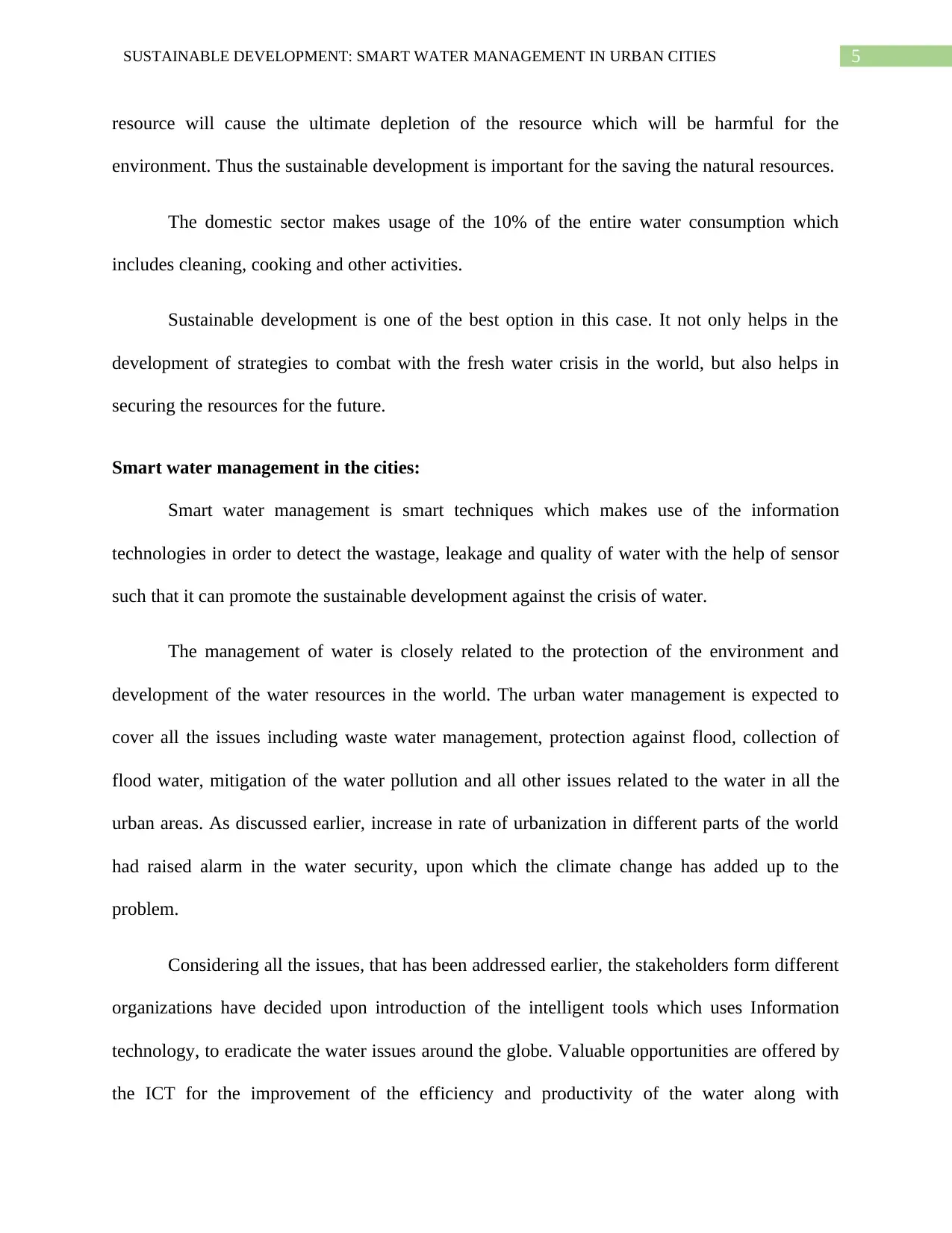
5SUSTAINABLE DEVELOPMENT: SMART WATER MANAGEMENT IN URBAN CITIES
resource will cause the ultimate depletion of the resource which will be harmful for the
environment. Thus the sustainable development is important for the saving the natural resources.
The domestic sector makes usage of the 10% of the entire water consumption which
includes cleaning, cooking and other activities.
Sustainable development is one of the best option in this case. It not only helps in the
development of strategies to combat with the fresh water crisis in the world, but also helps in
securing the resources for the future.
Smart water management in the cities:
Smart water management is smart techniques which makes use of the information
technologies in order to detect the wastage, leakage and quality of water with the help of sensor
such that it can promote the sustainable development against the crisis of water.
The management of water is closely related to the protection of the environment and
development of the water resources in the world. The urban water management is expected to
cover all the issues including waste water management, protection against flood, collection of
flood water, mitigation of the water pollution and all other issues related to the water in all the
urban areas. As discussed earlier, increase in rate of urbanization in different parts of the world
had raised alarm in the water security, upon which the climate change has added up to the
problem.
Considering all the issues, that has been addressed earlier, the stakeholders form different
organizations have decided upon introduction of the intelligent tools which uses Information
technology, to eradicate the water issues around the globe. Valuable opportunities are offered by
the ICT for the improvement of the efficiency and productivity of the water along with
resource will cause the ultimate depletion of the resource which will be harmful for the
environment. Thus the sustainable development is important for the saving the natural resources.
The domestic sector makes usage of the 10% of the entire water consumption which
includes cleaning, cooking and other activities.
Sustainable development is one of the best option in this case. It not only helps in the
development of strategies to combat with the fresh water crisis in the world, but also helps in
securing the resources for the future.
Smart water management in the cities:
Smart water management is smart techniques which makes use of the information
technologies in order to detect the wastage, leakage and quality of water with the help of sensor
such that it can promote the sustainable development against the crisis of water.
The management of water is closely related to the protection of the environment and
development of the water resources in the world. The urban water management is expected to
cover all the issues including waste water management, protection against flood, collection of
flood water, mitigation of the water pollution and all other issues related to the water in all the
urban areas. As discussed earlier, increase in rate of urbanization in different parts of the world
had raised alarm in the water security, upon which the climate change has added up to the
problem.
Considering all the issues, that has been addressed earlier, the stakeholders form different
organizations have decided upon introduction of the intelligent tools which uses Information
technology, to eradicate the water issues around the globe. Valuable opportunities are offered by
the ICT for the improvement of the efficiency and productivity of the water along with
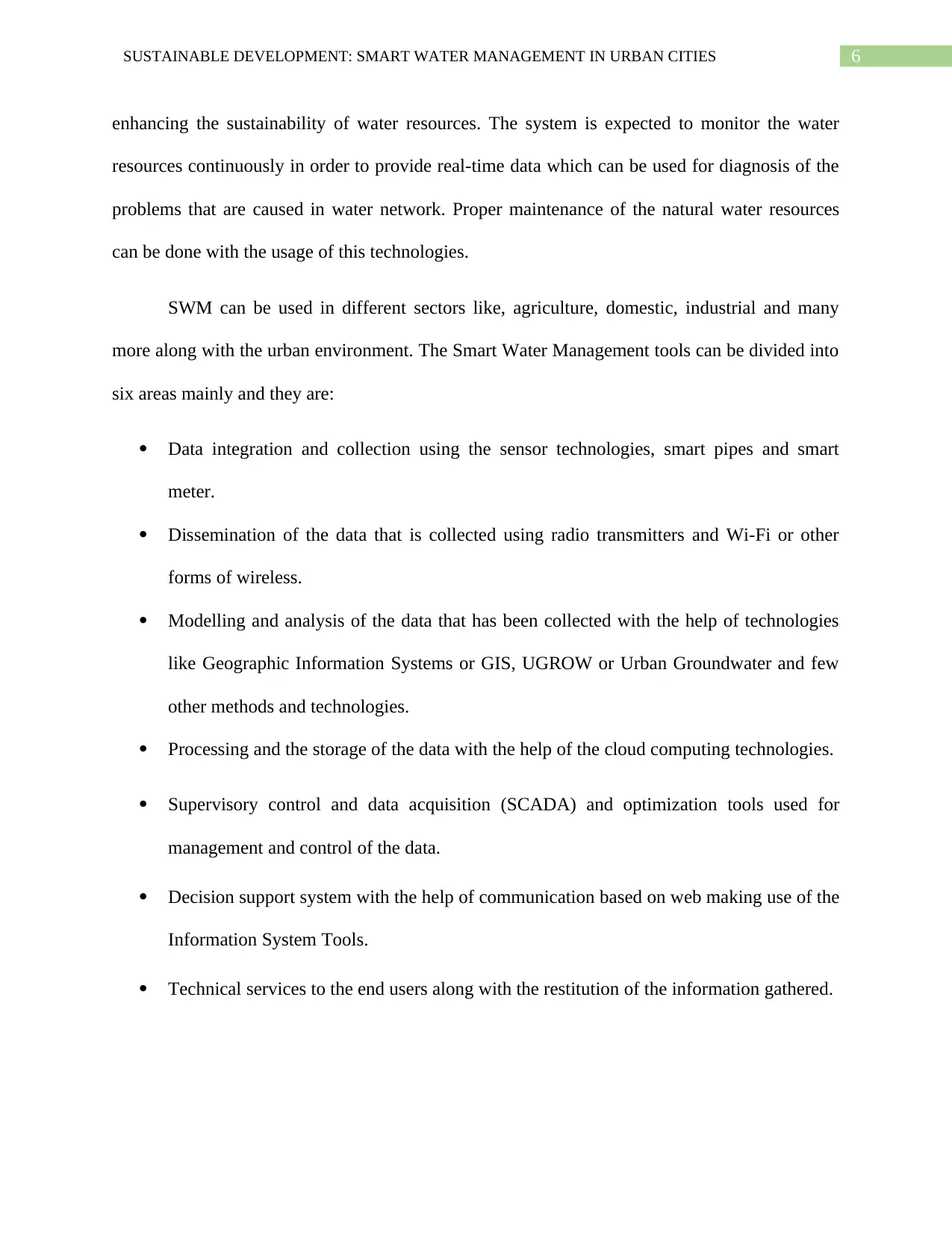
6SUSTAINABLE DEVELOPMENT: SMART WATER MANAGEMENT IN URBAN CITIES
enhancing the sustainability of water resources. The system is expected to monitor the water
resources continuously in order to provide real-time data which can be used for diagnosis of the
problems that are caused in water network. Proper maintenance of the natural water resources
can be done with the usage of this technologies.
SWM can be used in different sectors like, agriculture, domestic, industrial and many
more along with the urban environment. The Smart Water Management tools can be divided into
six areas mainly and they are:
Data integration and collection using the sensor technologies, smart pipes and smart
meter.
Dissemination of the data that is collected using radio transmitters and Wi-Fi or other
forms of wireless.
Modelling and analysis of the data that has been collected with the help of technologies
like Geographic Information Systems or GIS, UGROW or Urban Groundwater and few
other methods and technologies.
Processing and the storage of the data with the help of the cloud computing technologies.
Supervisory control and data acquisition (SCADA) and optimization tools used for
management and control of the data.
Decision support system with the help of communication based on web making use of the
Information System Tools.
Technical services to the end users along with the restitution of the information gathered.
enhancing the sustainability of water resources. The system is expected to monitor the water
resources continuously in order to provide real-time data which can be used for diagnosis of the
problems that are caused in water network. Proper maintenance of the natural water resources
can be done with the usage of this technologies.
SWM can be used in different sectors like, agriculture, domestic, industrial and many
more along with the urban environment. The Smart Water Management tools can be divided into
six areas mainly and they are:
Data integration and collection using the sensor technologies, smart pipes and smart
meter.
Dissemination of the data that is collected using radio transmitters and Wi-Fi or other
forms of wireless.
Modelling and analysis of the data that has been collected with the help of technologies
like Geographic Information Systems or GIS, UGROW or Urban Groundwater and few
other methods and technologies.
Processing and the storage of the data with the help of the cloud computing technologies.
Supervisory control and data acquisition (SCADA) and optimization tools used for
management and control of the data.
Decision support system with the help of communication based on web making use of the
Information System Tools.
Technical services to the end users along with the restitution of the information gathered.
Paraphrase This Document
Need a fresh take? Get an instant paraphrase of this document with our AI Paraphraser
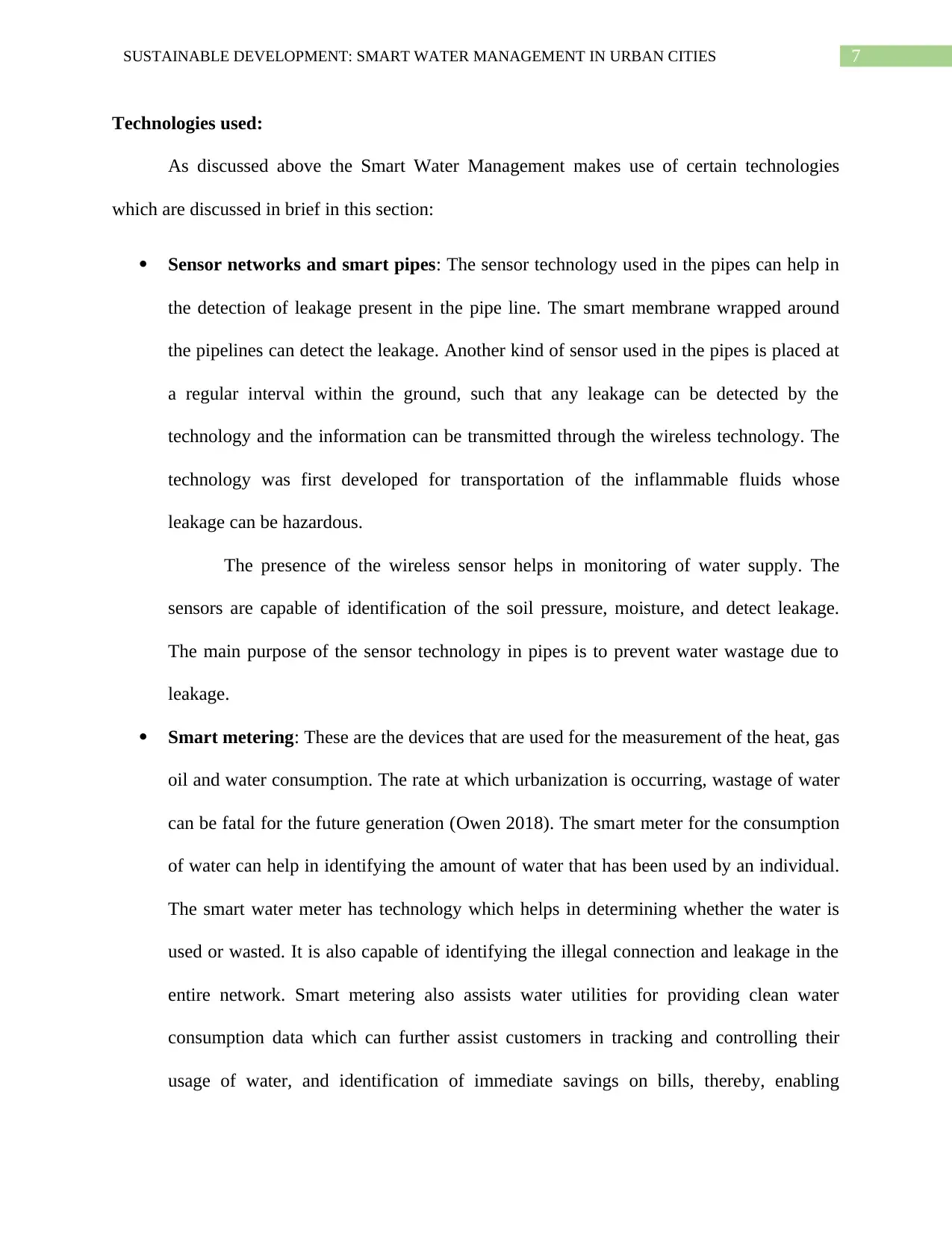
7SUSTAINABLE DEVELOPMENT: SMART WATER MANAGEMENT IN URBAN CITIES
Technologies used:
As discussed above the Smart Water Management makes use of certain technologies
which are discussed in brief in this section:
Sensor networks and smart pipes: The sensor technology used in the pipes can help in
the detection of leakage present in the pipe line. The smart membrane wrapped around
the pipelines can detect the leakage. Another kind of sensor used in the pipes is placed at
a regular interval within the ground, such that any leakage can be detected by the
technology and the information can be transmitted through the wireless technology. The
technology was first developed for transportation of the inflammable fluids whose
leakage can be hazardous.
The presence of the wireless sensor helps in monitoring of water supply. The
sensors are capable of identification of the soil pressure, moisture, and detect leakage.
The main purpose of the sensor technology in pipes is to prevent water wastage due to
leakage.
Smart metering: These are the devices that are used for the measurement of the heat, gas
oil and water consumption. The rate at which urbanization is occurring, wastage of water
can be fatal for the future generation (Owen 2018). The smart meter for the consumption
of water can help in identifying the amount of water that has been used by an individual.
The smart water meter has technology which helps in determining whether the water is
used or wasted. It is also capable of identifying the illegal connection and leakage in the
entire network. Smart metering also assists water utilities for providing clean water
consumption data which can further assist customers in tracking and controlling their
usage of water, and identification of immediate savings on bills, thereby, enabling
Technologies used:
As discussed above the Smart Water Management makes use of certain technologies
which are discussed in brief in this section:
Sensor networks and smart pipes: The sensor technology used in the pipes can help in
the detection of leakage present in the pipe line. The smart membrane wrapped around
the pipelines can detect the leakage. Another kind of sensor used in the pipes is placed at
a regular interval within the ground, such that any leakage can be detected by the
technology and the information can be transmitted through the wireless technology. The
technology was first developed for transportation of the inflammable fluids whose
leakage can be hazardous.
The presence of the wireless sensor helps in monitoring of water supply. The
sensors are capable of identification of the soil pressure, moisture, and detect leakage.
The main purpose of the sensor technology in pipes is to prevent water wastage due to
leakage.
Smart metering: These are the devices that are used for the measurement of the heat, gas
oil and water consumption. The rate at which urbanization is occurring, wastage of water
can be fatal for the future generation (Owen 2018). The smart meter for the consumption
of water can help in identifying the amount of water that has been used by an individual.
The smart water meter has technology which helps in determining whether the water is
used or wasted. It is also capable of identifying the illegal connection and leakage in the
entire network. Smart metering also assists water utilities for providing clean water
consumption data which can further assist customers in tracking and controlling their
usage of water, and identification of immediate savings on bills, thereby, enabling
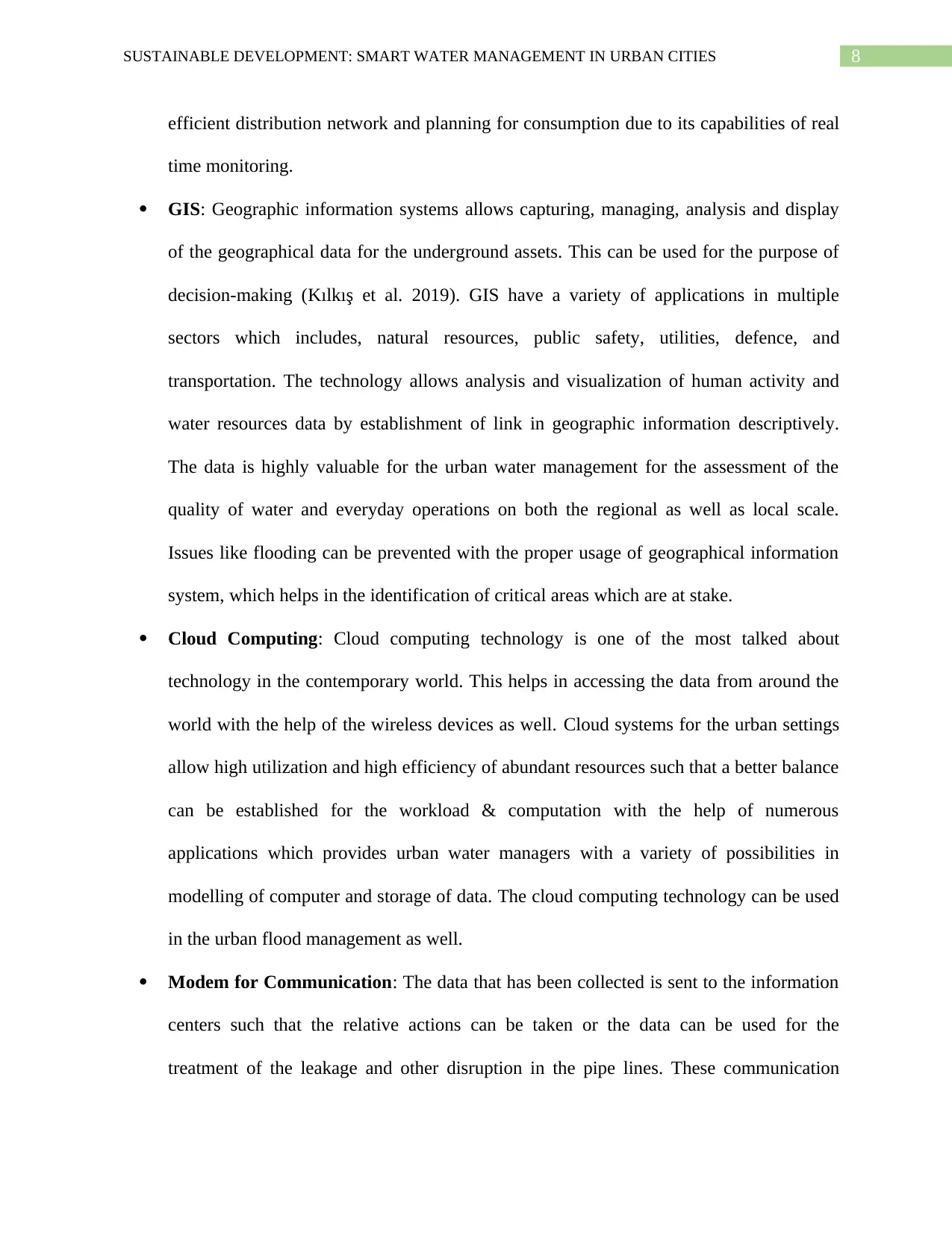
8SUSTAINABLE DEVELOPMENT: SMART WATER MANAGEMENT IN URBAN CITIES
efficient distribution network and planning for consumption due to its capabilities of real
time monitoring.
GIS: Geographic information systems allows capturing, managing, analysis and display
of the geographical data for the underground assets. This can be used for the purpose of
decision-making (Kılkış et al. 2019). GIS have a variety of applications in multiple
sectors which includes, natural resources, public safety, utilities, defence, and
transportation. The technology allows analysis and visualization of human activity and
water resources data by establishment of link in geographic information descriptively.
The data is highly valuable for the urban water management for the assessment of the
quality of water and everyday operations on both the regional as well as local scale.
Issues like flooding can be prevented with the proper usage of geographical information
system, which helps in the identification of critical areas which are at stake.
Cloud Computing: Cloud computing technology is one of the most talked about
technology in the contemporary world. This helps in accessing the data from around the
world with the help of the wireless devices as well. Cloud systems for the urban settings
allow high utilization and high efficiency of abundant resources such that a better balance
can be established for the workload & computation with the help of numerous
applications which provides urban water managers with a variety of possibilities in
modelling of computer and storage of data. The cloud computing technology can be used
in the urban flood management as well.
Modem for Communication: The data that has been collected is sent to the information
centers such that the relative actions can be taken or the data can be used for the
treatment of the leakage and other disruption in the pipe lines. These communication
efficient distribution network and planning for consumption due to its capabilities of real
time monitoring.
GIS: Geographic information systems allows capturing, managing, analysis and display
of the geographical data for the underground assets. This can be used for the purpose of
decision-making (Kılkış et al. 2019). GIS have a variety of applications in multiple
sectors which includes, natural resources, public safety, utilities, defence, and
transportation. The technology allows analysis and visualization of human activity and
water resources data by establishment of link in geographic information descriptively.
The data is highly valuable for the urban water management for the assessment of the
quality of water and everyday operations on both the regional as well as local scale.
Issues like flooding can be prevented with the proper usage of geographical information
system, which helps in the identification of critical areas which are at stake.
Cloud Computing: Cloud computing technology is one of the most talked about
technology in the contemporary world. This helps in accessing the data from around the
world with the help of the wireless devices as well. Cloud systems for the urban settings
allow high utilization and high efficiency of abundant resources such that a better balance
can be established for the workload & computation with the help of numerous
applications which provides urban water managers with a variety of possibilities in
modelling of computer and storage of data. The cloud computing technology can be used
in the urban flood management as well.
Modem for Communication: The data that has been collected is sent to the information
centers such that the relative actions can be taken or the data can be used for the
treatment of the leakage and other disruption in the pipe lines. These communication
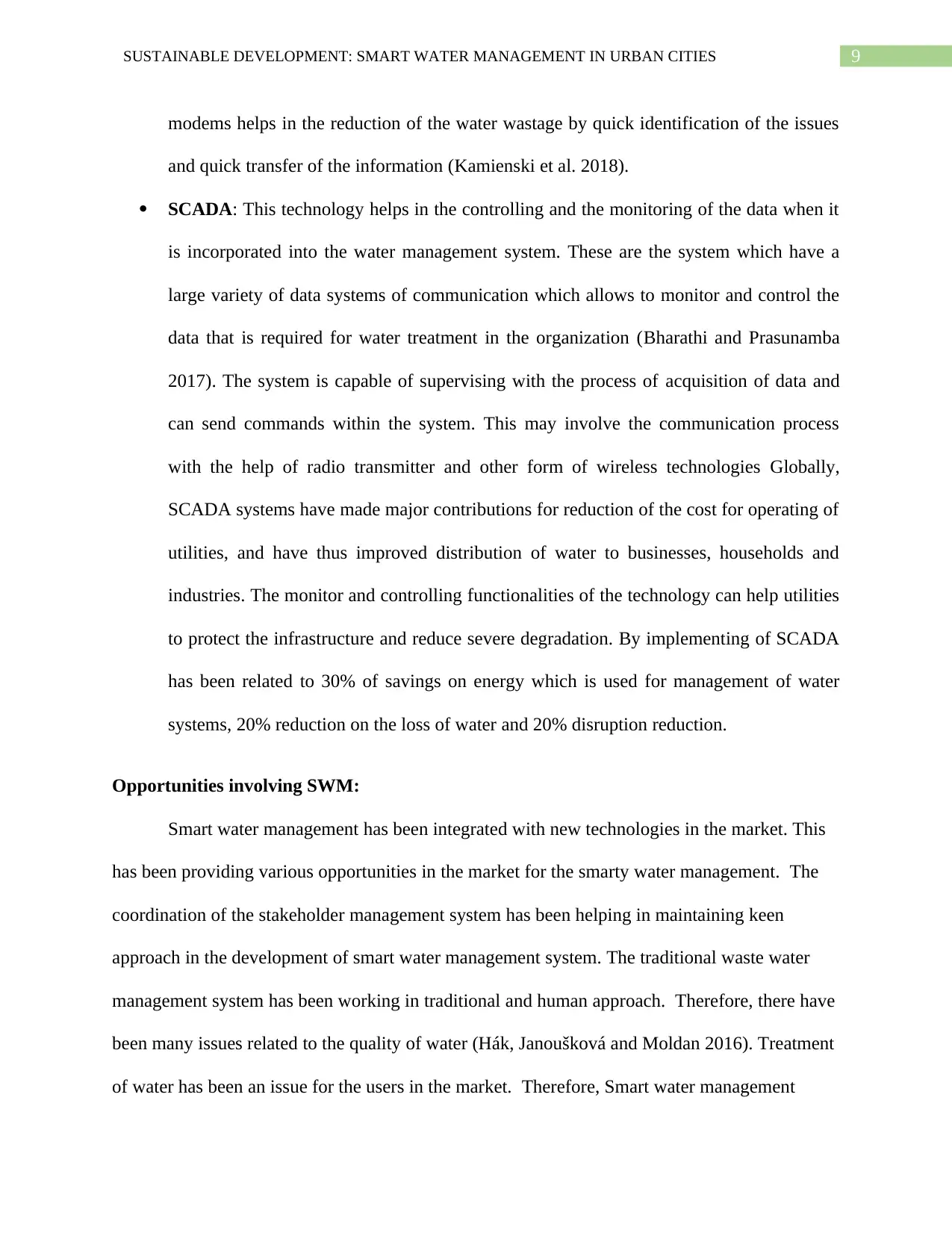
9SUSTAINABLE DEVELOPMENT: SMART WATER MANAGEMENT IN URBAN CITIES
modems helps in the reduction of the water wastage by quick identification of the issues
and quick transfer of the information (Kamienski et al. 2018).
SCADA: This technology helps in the controlling and the monitoring of the data when it
is incorporated into the water management system. These are the system which have a
large variety of data systems of communication which allows to monitor and control the
data that is required for water treatment in the organization (Bharathi and Prasunamba
2017). The system is capable of supervising with the process of acquisition of data and
can send commands within the system. This may involve the communication process
with the help of radio transmitter and other form of wireless technologies Globally,
SCADA systems have made major contributions for reduction of the cost for operating of
utilities, and have thus improved distribution of water to businesses, households and
industries. The monitor and controlling functionalities of the technology can help utilities
to protect the infrastructure and reduce severe degradation. By implementing of SCADA
has been related to 30% of savings on energy which is used for management of water
systems, 20% reduction on the loss of water and 20% disruption reduction.
Opportunities involving SWM:
Smart water management has been integrated with new technologies in the market. This
has been providing various opportunities in the market for the smarty water management. The
coordination of the stakeholder management system has been helping in maintaining keen
approach in the development of smart water management system. The traditional waste water
management system has been working in traditional and human approach. Therefore, there have
been many issues related to the quality of water (Hák, Janoušková and Moldan 2016). Treatment
of water has been an issue for the users in the market. Therefore, Smart water management
modems helps in the reduction of the water wastage by quick identification of the issues
and quick transfer of the information (Kamienski et al. 2018).
SCADA: This technology helps in the controlling and the monitoring of the data when it
is incorporated into the water management system. These are the system which have a
large variety of data systems of communication which allows to monitor and control the
data that is required for water treatment in the organization (Bharathi and Prasunamba
2017). The system is capable of supervising with the process of acquisition of data and
can send commands within the system. This may involve the communication process
with the help of radio transmitter and other form of wireless technologies Globally,
SCADA systems have made major contributions for reduction of the cost for operating of
utilities, and have thus improved distribution of water to businesses, households and
industries. The monitor and controlling functionalities of the technology can help utilities
to protect the infrastructure and reduce severe degradation. By implementing of SCADA
has been related to 30% of savings on energy which is used for management of water
systems, 20% reduction on the loss of water and 20% disruption reduction.
Opportunities involving SWM:
Smart water management has been integrated with new technologies in the market. This
has been providing various opportunities in the market for the smarty water management. The
coordination of the stakeholder management system has been helping in maintaining keen
approach in the development of smart water management system. The traditional waste water
management system has been working in traditional and human approach. Therefore, there have
been many issues related to the quality of water (Hák, Janoušková and Moldan 2016). Treatment
of water has been an issue for the users in the market. Therefore, Smart water management
Secure Best Marks with AI Grader
Need help grading? Try our AI Grader for instant feedback on your assignments.
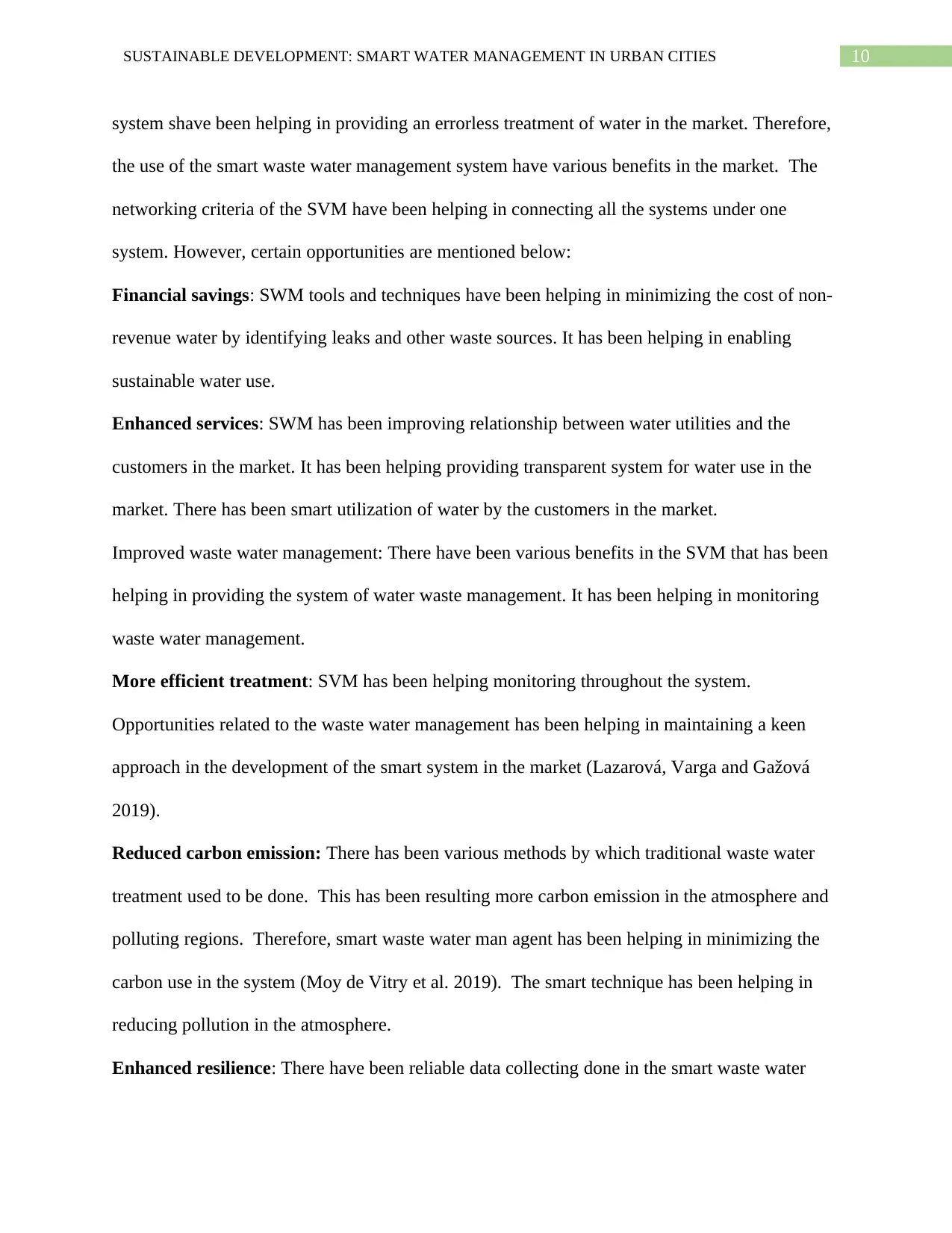
10SUSTAINABLE DEVELOPMENT: SMART WATER MANAGEMENT IN URBAN CITIES
system shave been helping in providing an errorless treatment of water in the market. Therefore,
the use of the smart waste water management system have various benefits in the market. The
networking criteria of the SVM have been helping in connecting all the systems under one
system. However, certain opportunities are mentioned below:
Financial savings: SWM tools and techniques have been helping in minimizing the cost of non-
revenue water by identifying leaks and other waste sources. It has been helping in enabling
sustainable water use.
Enhanced services: SWM has been improving relationship between water utilities and the
customers in the market. It has been helping providing transparent system for water use in the
market. There has been smart utilization of water by the customers in the market.
Improved waste water management: There have been various benefits in the SVM that has been
helping in providing the system of water waste management. It has been helping in monitoring
waste water management.
More efficient treatment: SVM has been helping monitoring throughout the system.
Opportunities related to the waste water management has been helping in maintaining a keen
approach in the development of the smart system in the market (Lazarová, Varga and Gažová
2019).
Reduced carbon emission: There has been various methods by which traditional waste water
treatment used to be done. This has been resulting more carbon emission in the atmosphere and
polluting regions. Therefore, smart waste water man agent has been helping in minimizing the
carbon use in the system (Moy de Vitry et al. 2019). The smart technique has been helping in
reducing pollution in the atmosphere.
Enhanced resilience: There have been reliable data collecting done in the smart waste water
system shave been helping in providing an errorless treatment of water in the market. Therefore,
the use of the smart waste water management system have various benefits in the market. The
networking criteria of the SVM have been helping in connecting all the systems under one
system. However, certain opportunities are mentioned below:
Financial savings: SWM tools and techniques have been helping in minimizing the cost of non-
revenue water by identifying leaks and other waste sources. It has been helping in enabling
sustainable water use.
Enhanced services: SWM has been improving relationship between water utilities and the
customers in the market. It has been helping providing transparent system for water use in the
market. There has been smart utilization of water by the customers in the market.
Improved waste water management: There have been various benefits in the SVM that has been
helping in providing the system of water waste management. It has been helping in monitoring
waste water management.
More efficient treatment: SVM has been helping monitoring throughout the system.
Opportunities related to the waste water management has been helping in maintaining a keen
approach in the development of the smart system in the market (Lazarová, Varga and Gažová
2019).
Reduced carbon emission: There has been various methods by which traditional waste water
treatment used to be done. This has been resulting more carbon emission in the atmosphere and
polluting regions. Therefore, smart waste water man agent has been helping in minimizing the
carbon use in the system (Moy de Vitry et al. 2019). The smart technique has been helping in
reducing pollution in the atmosphere.
Enhanced resilience: There have been reliable data collecting done in the smart waste water
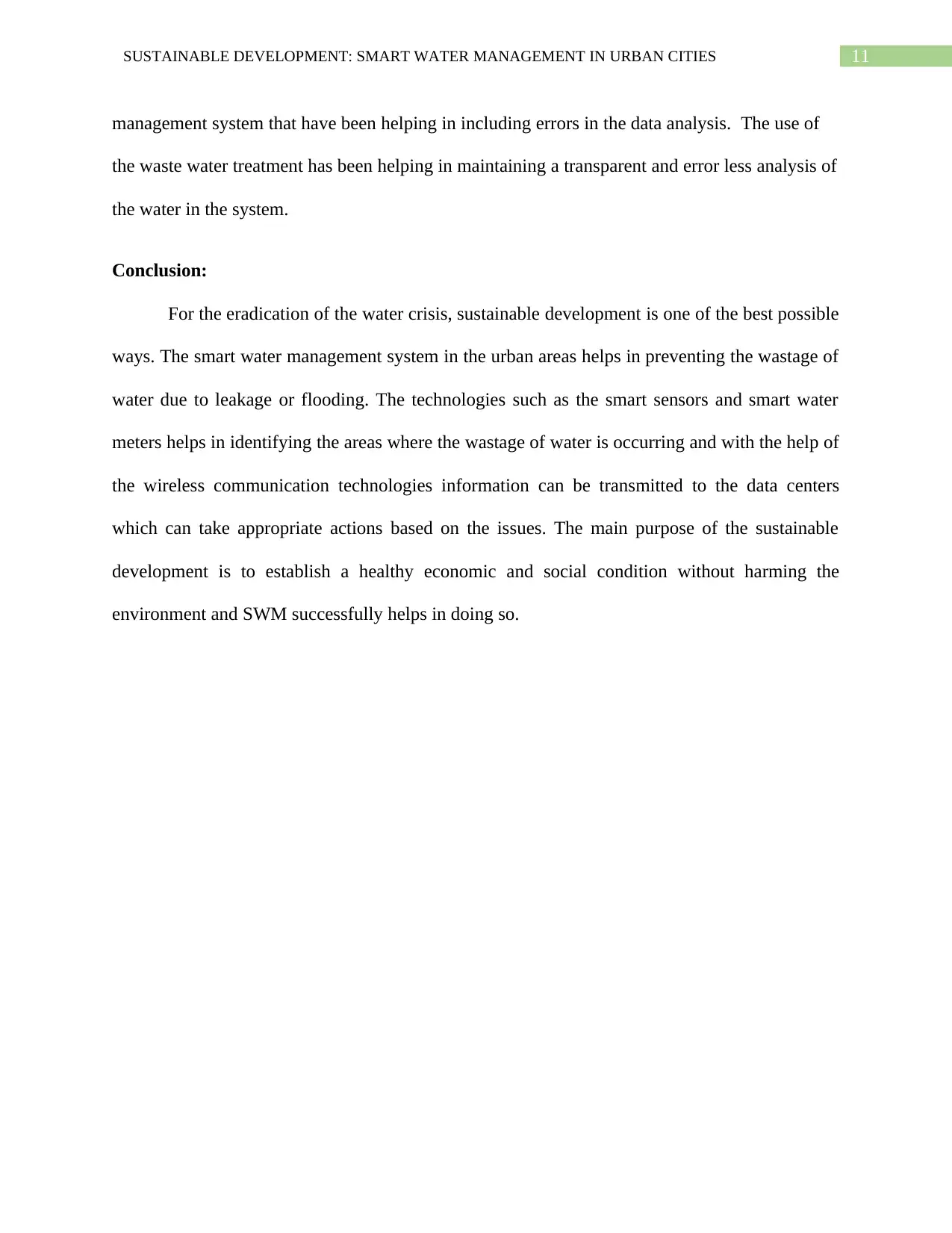
11SUSTAINABLE DEVELOPMENT: SMART WATER MANAGEMENT IN URBAN CITIES
management system that have been helping in including errors in the data analysis. The use of
the waste water treatment has been helping in maintaining a transparent and error less analysis of
the water in the system.
Conclusion:
For the eradication of the water crisis, sustainable development is one of the best possible
ways. The smart water management system in the urban areas helps in preventing the wastage of
water due to leakage or flooding. The technologies such as the smart sensors and smart water
meters helps in identifying the areas where the wastage of water is occurring and with the help of
the wireless communication technologies information can be transmitted to the data centers
which can take appropriate actions based on the issues. The main purpose of the sustainable
development is to establish a healthy economic and social condition without harming the
environment and SWM successfully helps in doing so.
management system that have been helping in including errors in the data analysis. The use of
the waste water treatment has been helping in maintaining a transparent and error less analysis of
the water in the system.
Conclusion:
For the eradication of the water crisis, sustainable development is one of the best possible
ways. The smart water management system in the urban areas helps in preventing the wastage of
water due to leakage or flooding. The technologies such as the smart sensors and smart water
meters helps in identifying the areas where the wastage of water is occurring and with the help of
the wireless communication technologies information can be transmitted to the data centers
which can take appropriate actions based on the issues. The main purpose of the sustainable
development is to establish a healthy economic and social condition without harming the
environment and SWM successfully helps in doing so.
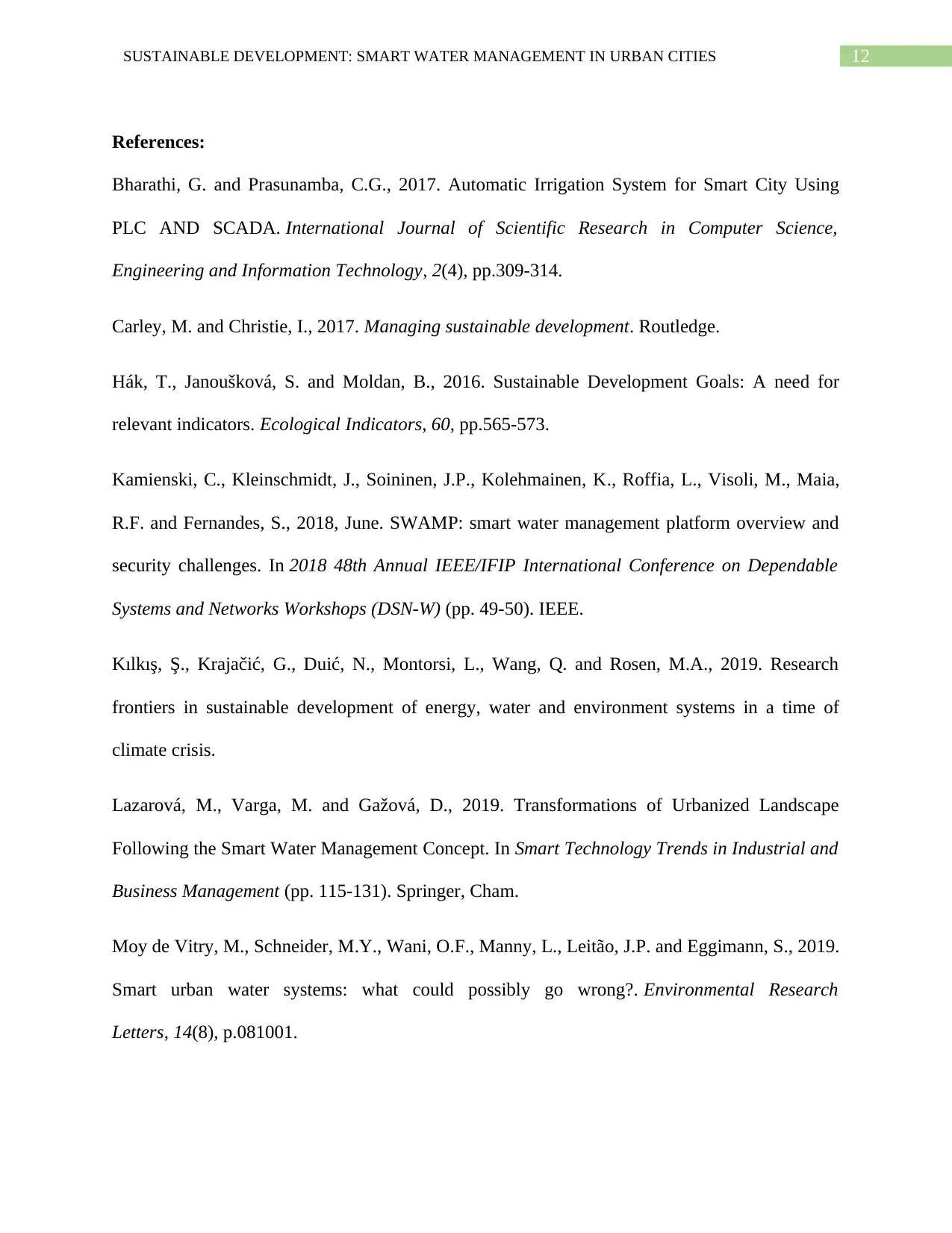
12SUSTAINABLE DEVELOPMENT: SMART WATER MANAGEMENT IN URBAN CITIES
References:
Bharathi, G. and Prasunamba, C.G., 2017. Automatic Irrigation System for Smart City Using
PLC AND SCADA. International Journal of Scientific Research in Computer Science,
Engineering and Information Technology, 2(4), pp.309-314.
Carley, M. and Christie, I., 2017. Managing sustainable development. Routledge.
Hák, T., Janoušková, S. and Moldan, B., 2016. Sustainable Development Goals: A need for
relevant indicators. Ecological Indicators, 60, pp.565-573.
Kamienski, C., Kleinschmidt, J., Soininen, J.P., Kolehmainen, K., Roffia, L., Visoli, M., Maia,
R.F. and Fernandes, S., 2018, June. SWAMP: smart water management platform overview and
security challenges. In 2018 48th Annual IEEE/IFIP International Conference on Dependable
Systems and Networks Workshops (DSN-W) (pp. 49-50). IEEE.
Kılkış, Ş., Krajačić, G., Duić, N., Montorsi, L., Wang, Q. and Rosen, M.A., 2019. Research
frontiers in sustainable development of energy, water and environment systems in a time of
climate crisis.
Lazarová, M., Varga, M. and Gažová, D., 2019. Transformations of Urbanized Landscape
Following the Smart Water Management Concept. In Smart Technology Trends in Industrial and
Business Management (pp. 115-131). Springer, Cham.
Moy de Vitry, M., Schneider, M.Y., Wani, O.F., Manny, L., Leitão, J.P. and Eggimann, S., 2019.
Smart urban water systems: what could possibly go wrong?. Environmental Research
Letters, 14(8), p.081001.
References:
Bharathi, G. and Prasunamba, C.G., 2017. Automatic Irrigation System for Smart City Using
PLC AND SCADA. International Journal of Scientific Research in Computer Science,
Engineering and Information Technology, 2(4), pp.309-314.
Carley, M. and Christie, I., 2017. Managing sustainable development. Routledge.
Hák, T., Janoušková, S. and Moldan, B., 2016. Sustainable Development Goals: A need for
relevant indicators. Ecological Indicators, 60, pp.565-573.
Kamienski, C., Kleinschmidt, J., Soininen, J.P., Kolehmainen, K., Roffia, L., Visoli, M., Maia,
R.F. and Fernandes, S., 2018, June. SWAMP: smart water management platform overview and
security challenges. In 2018 48th Annual IEEE/IFIP International Conference on Dependable
Systems and Networks Workshops (DSN-W) (pp. 49-50). IEEE.
Kılkış, Ş., Krajačić, G., Duić, N., Montorsi, L., Wang, Q. and Rosen, M.A., 2019. Research
frontiers in sustainable development of energy, water and environment systems in a time of
climate crisis.
Lazarová, M., Varga, M. and Gažová, D., 2019. Transformations of Urbanized Landscape
Following the Smart Water Management Concept. In Smart Technology Trends in Industrial and
Business Management (pp. 115-131). Springer, Cham.
Moy de Vitry, M., Schneider, M.Y., Wani, O.F., Manny, L., Leitão, J.P. and Eggimann, S., 2019.
Smart urban water systems: what could possibly go wrong?. Environmental Research
Letters, 14(8), p.081001.
Paraphrase This Document
Need a fresh take? Get an instant paraphrase of this document with our AI Paraphraser
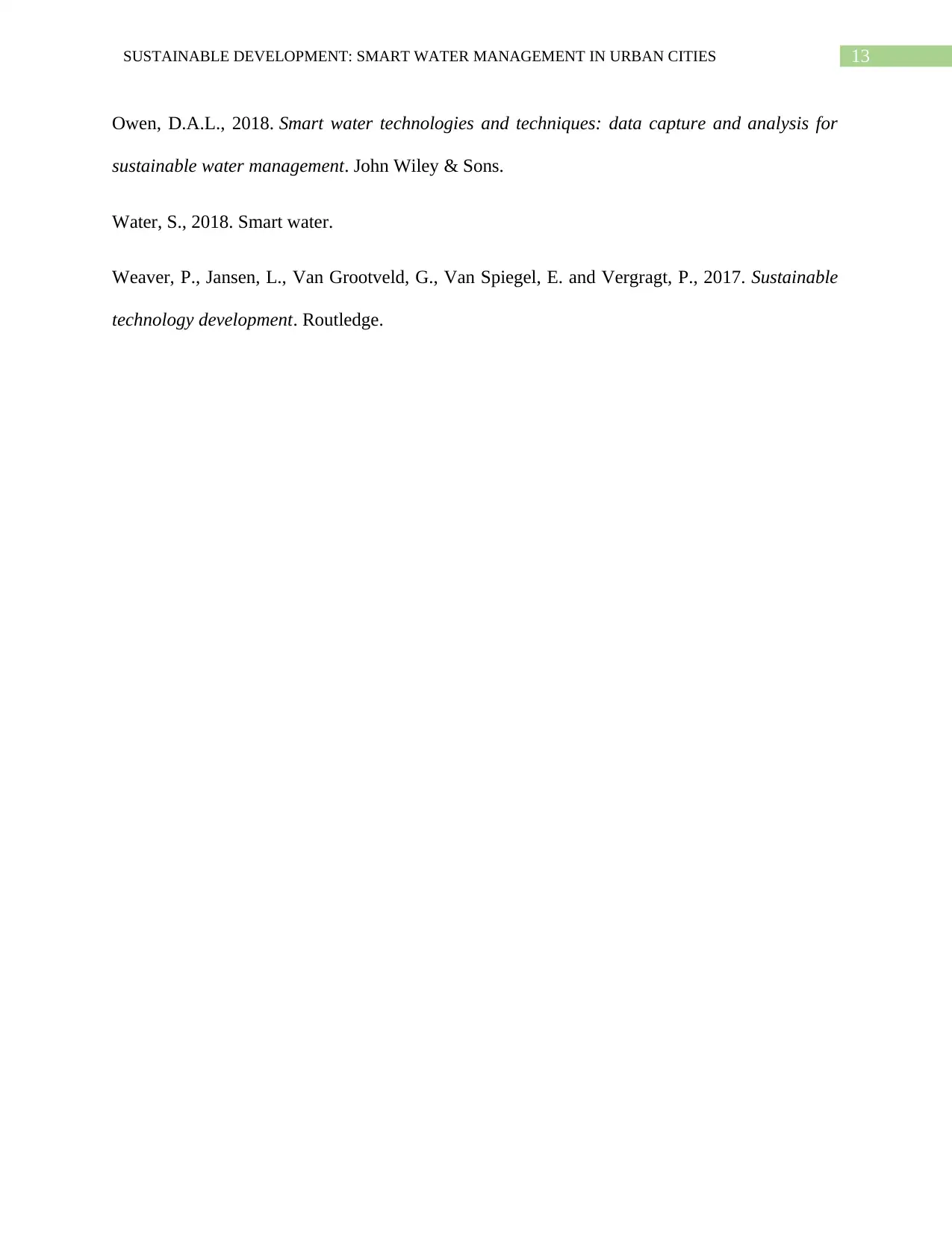
13SUSTAINABLE DEVELOPMENT: SMART WATER MANAGEMENT IN URBAN CITIES
Owen, D.A.L., 2018. Smart water technologies and techniques: data capture and analysis for
sustainable water management. John Wiley & Sons.
Water, S., 2018. Smart water.
Weaver, P., Jansen, L., Van Grootveld, G., Van Spiegel, E. and Vergragt, P., 2017. Sustainable
technology development. Routledge.
Owen, D.A.L., 2018. Smart water technologies and techniques: data capture and analysis for
sustainable water management. John Wiley & Sons.
Water, S., 2018. Smart water.
Weaver, P., Jansen, L., Van Grootveld, G., Van Spiegel, E. and Vergragt, P., 2017. Sustainable
technology development. Routledge.
1 out of 14
Related Documents
Your All-in-One AI-Powered Toolkit for Academic Success.
+13062052269
info@desklib.com
Available 24*7 on WhatsApp / Email
![[object Object]](/_next/static/media/star-bottom.7253800d.svg)
Unlock your academic potential
© 2024 | Zucol Services PVT LTD | All rights reserved.





